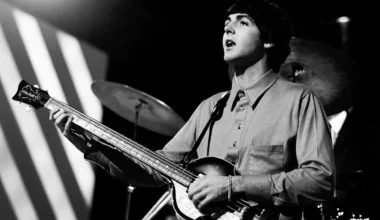Without a doubt, David Gilmour was a major factor in turning Pink Floyd from a quirky psychedelic band into a well-known phenomenon. The space rock that the band’s lead singer, Syd Barrett, created was specialised and period-specific, even though their breakthrough album, The Piper at the Gates of Dawn, was a huge hit and crucial to the genre’s development. After they brought on a new guitarist, their previously gritty and aggressive sound started to grow softer.
It was evident that Gilmour’s arrival in 1967 would take the band in a new creative direction as they worked to finish their much awaited second album, A Saucerful of Secrets, and navigate Barrett’s rapidly declining mental health. After the album, Pink Floyd continued to experiment extensively. They began refining their sound and moving towards a more polished and imposing look.
Given that Gilmour’s experience was mostly in R&B cover bands, which favoured an improvisational approach very different from the freak-out jams that defined the “See Emily Play” group, it’s interesting that he had such an influence on Pink Floyd. Even Gilmour has acknowledged that it took him some time to grasp the quartet’s creative direction. Initially, he didn’t find their improvisations compelling. Ever since those early days, Gilmour has explained that the songwriting process changed after he joined in two ways. First, he tried to influence it, and then, in turn, it changed and influenced him.
Throughout his entire oeuvre, Gilmour has been a realistic artist. He has never held back when discussing the highs and lows of his time spent leading Pink Floyd. He said that the band knew they had found a new territory with the title track of A Saucerful of Secrets, moving away from the past and towards the grandeur of classics like 1973‘s The Dark Side of the Moon.
After that, the group also made an impression on Gilmour with their approach. So, he began incorporating what he knew about harmony into the mix and making them sound more mainstream. In 1992, he stated to Musician, “I was definitely educated by the way they worked.” We shared with each other all of our unique aspirations, skills, and knowledge. It was this back-and-forth that produced an era of unquestionable genius.
For everyone involved, it was a time of great positive transformation. Things would not begin to fall apart for the band until after the phenomenal success of their 1973 masterpiece. This ultimately caused the rift between Gilmour and Roger Waters, which still exists today after the latter’s contentious exit following 1983’s The Final Cut.
The band’s breakup with Waters and Gilmour’s wounds were still fresh when Musician spoke with them. This naturally altered Pink Floyd’s artistic vision for the former. In response to a question about whether his former songwriting collaborator was a strong bassist during the intense period of A Saucerful of Secrets, Gilmour remembered his arch-enemy’s “limited” strategy with characteristic eloquence.
“He had developed his own limited, or very simple style,” the guitarist remarked. He never really cared to get better at playing the bass. So, I would usually play the bass on the records since I could do it faster. Going back to those early records, I mean, I play at least half the bass on everything that has been recorded, so it’s me.”
Then it became known that Gilmour contributed the fretless bass to the song “Hey You” from The Wall (1979). Indeed, he replied. Well. Roger using a fretless bass? Please?
It’s also impossible to verify the veracity of Gilmour’s other claim. Especially considering their tense relationship at the time—that Waters occasionally thanked him for winning him bass-playing polls. Even in the good old days, they were a cynical bunch all along.







